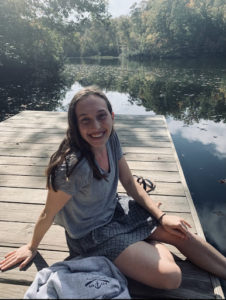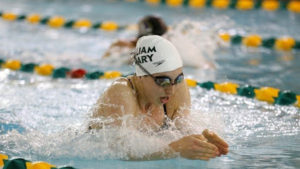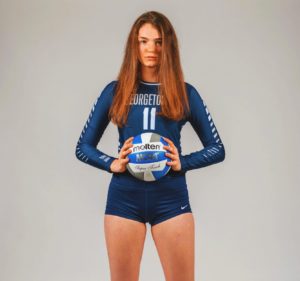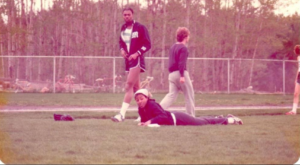Ellie Henry is currently a junior at the College of William and Mary in Williamsburg, VA.
She’s majoring in Linguistics and is a member of the varsity swim team. Ellie’s eager to finish her junior and senior years as a leader on the team and leave the team better than she found it.
In high school, Ellie broke a 14-year North Carolina Independent Schools Athletic Association 1A/2A state record. In college, she broke W&M’s freshman record in the 100 IM at Navy in mid-October, timing 1:00.01. In 2019-2020, she received CAA Commissioner’s Academic Honor Roll for having a GPA over 3.0 in the fall.
Ellie Henry works hard to find a healthy balance between academics, athletics, and social life. She’s a member of the varsity swim team, the Tri Delta sorority, and is a full-time student at William and Mary. Ellie has realized that her sport does not define who she is and has involved herself in many groups outside of it. She serves as a great example of maintaining balance as a student-athlete. I hope that her story will be inspiring to others who may be going through what she did, or those who are in need of a reminder of how much more they are than their sport.
When did you start swimming? What led you to decide that you wanted to swim at the college level?
I learned how to swim through the Sandhills Sandsharks program, and I also swam competitively for them until my junior year in high school. I have always been passionate about the sport, and swimming in college was a way for me to pursue it at a higher level. Before college, swimming was a very large part of my identity. At that point, it was not a hard decision to swim in college. It was also much easier for me to get into a Division 1 mid-major college through a varsity sport. My test grades were good, but I have never been very strong in testing. I knew my strengths and weaknesses, and took advantage of them!
How was the transition from high school to college, both athletically and academically? Did it bring any specific new challenges?
The transition from high school to college was a difficult one, to say the least. To put it bluntly, O’Neal did not prepare me enough for college. It was such a small school, and there was little to no flexibility in courses, which made it incredibly difficult to pursue things I was interested in. Due to the way that O’Neal structures its academic course load, there was not much opportunity to take college-level-type AP classes. The grades were especially a big transition for me. One thing I had not recognized was the amount that teachers had weighted my grades, and grade point averages in courses over my four years in high school. I think it gave me a false sense of confidence going into my freshmen semester at William and Mary, and I ended up with very low grades my first year. It was a big adjustment, but it made for a great learning experience! I learned to reach out more to my professors, go to office hours, and be vocal in class. Not only that, but being a part of the varsity swim team also gave me access to integral sources that I would not have had otherwise. I was able to be provided with free tutoring services, as well as an academic coordinator who assisted with reaching out to professors, going over course loads, and course registration.
Have you had any experiences with injuries or mental health during your athletic career? If so, how have you dealt with it?
My senior year in high school and into my freshman year in college I started developing deep feelings of anxiety and depression. It took a long time for me to recover from this, and it was a very dark and challenging time in my life. I dealt with frequent panic and anxiety attacks. I had trouble thinking clearly, and it affected my choices, sleep, and relationships. Although this anxiety did not transfer into my performance in swimming. I had a great freshman year, breaking a team record in my first few months, and scoring the fifth most points overall on the team. I don’t think that that was my problem. After a lot of therapy I have deduced that I had built up unreasonable expectations about what college was supposed to be. My high school experience was not ideal, and I felt a lot of the time that I had to be as neutral as possible (for lack of a better word). I did not want to make enemies, and I wanted to stay on even ground with my classmates. For most of us, we had been together for ten plus years. We had 23 by graduation, and many of my classes were five or less people. I was very dependent on keeping friendly relationships with these people. So swimming was always my outlet to express myself, and also a way to get out my stress. It was also something I was good at, which probably helped. My junior year my club team coach quit, and the program was pretty much left to fall apart. Junior year, Sandhills Sandsharks was kicked out of the O’Neal school pool, which left me without a facility to train in. We relocated to various pools around Moore country, with pretty poor conditions for having a good practice. I was pretty out of shape, and my times reflected that. I had not dropped much time since we got kicked out of O’Neal, and I was only training with one other person in my senior group. I was lucky to find William and Mary because they valued people who were good people. Times were not as important, which worked in my favor. Yet what I discovered later, was that swimming was a trigger. I did not feel accepted by my teammates and was not doing well in my classes. Whenever I would get into the main set during practice, that was when my attacks would start. It got so bad that at one point I was having attacks at least twice a week. It was a very negative cycle. Luckily, I was able to pull myself out of it, with a lot of therapy, mindfulness, and reevaluation of my goals.
What is the most impactful piece of advice you have been given and how did it impact you?
Getting into a negative mindset can be so dangerous. Once you have one negative thought, it is so easy to spiral into thinking of ten other negative thoughts just like it. Having a positive outlook is so important. Self-care is also important. Being able to recognize negative thoughts, is one thing, but being able to change the way you view things is entirely another. Freshman year was rock bottom low point, and the only way to go is up! Set goals that are achievable. And don’t set goals that are too high either. If you do set a high goal, make sure there is not too much pressure on accomplishing it. Once I took the pressure off of myself to be the most perfect image of myself, it became so much easier to recognize my flaws and learn from them.
Earlier this year, you found out that your school would be cutting many sports programs, but more specifically, the swim program you are a member of. How were you feeling? What did you do to try to process it?
This is my junior year. My sophomore year I was able to put into practice the new mindset I put in place for myself, and I felt so much better. I felt happier in the pool and happier about who I am as a person. I had confidence that I did not have a year or even two years before that. When I heard that the teams were getting cut, I was of course devastated. But swimming wasn’t my whole life anymore. I don’t think it was nearly as painful as it would have been if I had put more pressure on my performance in swimming. I felt much more settled. I had chosen to major in Linguistics sophomore year, and to minor in psychology. I was rushing for a sorority, and doing independent research with a senior-level linguistics professor. There were now other things in my life occupying space, and that are important to me. I found other passions.
The William and Mary swim program as a whole did a lot of fundraising and social media posting in the effort to try to keep the program. Do you feel that the swim program has a strengthened bond because of how hard you all fought for your sport?
The team has always been a tribe; both a tribe and a Tribe :). People always consider it to be a family, and in some ways it is. We support each other in any situation. We needed people to step up, and people did. It just reaffirmed my trust and love for not only this team but the program as a whole. It is the most united I have ever felt with this team. And now that we are reinstated it only makes me even more happy and grateful to be able to get into the pool every day and swim.
In general, do you feel that there are inequalities between men and women athletes? Have you had any personal experiences that have strengthened your opinion?
I think the college has always been very conscious of creating opportunities for both men and women. I don’t think I have ever felt slighted in any way because of my gender. The great thing about the sport of swimming is that it is coed, so we are always practicing with the men. We feel support for them, and they support us.
What do you believe to be the best part of being a woman athlete?
I think being a female athlete gives me strength. Not only physical strength but also mental strength. Swimming is tough, and a very mental sport. Once you’re in the water, it’s really just you and the clock. Being an athlete has taught me so many life skills that I am able to apply in all sorts of situations. Among other things, I feel it’s made me a confident and strong person.
Do you have any specific goals for this year or the next few years? If so, how do you plan to accomplish them?
I want to finish out my junior and senior year on the team. One of our old coaches used to always say ‘leave the team better than you found it’, and that’s really what I want to do. Now that I have learned so much, I want to lead the team with that knowledge, the best I can.
Written by Holly Pashley, edited by Aoife Parr and Taylor Treacy.





